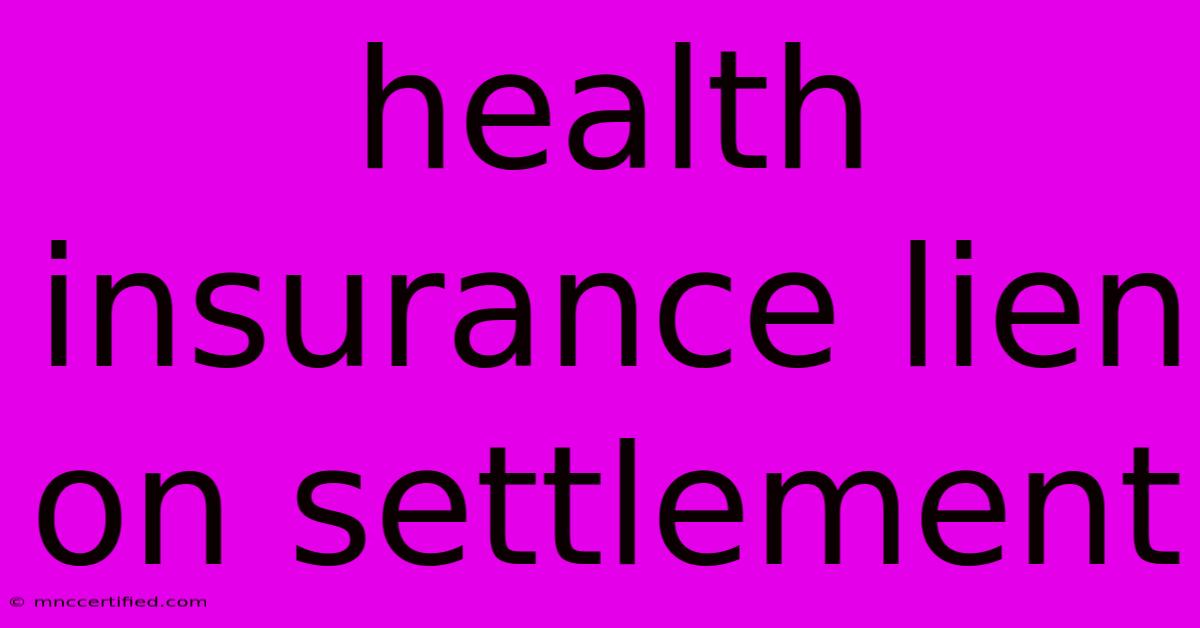Health Insurance Lien On Settlement

Table of Contents
Navigating the Complexities of Health Insurance Liens on Settlements
Receiving a settlement for an injury or illness can feel like a huge relief, but it can also be a complex process, especially when dealing with health insurance liens. These liens, often referred to as subrogation rights, represent the right of your health insurance company to recover the costs of your treatment from your settlement proceeds. Understanding how liens work and navigating this process is crucial to maximizing your compensation.
What is a Health Insurance Lien?
A health insurance lien is a legal claim your health insurance company places on your settlement to recoup the money they paid for your medical expenses. This is common practice and is usually outlined in your insurance policy.
Here's how it typically works:
- You receive treatment for an injury or illness covered by your health insurance.
- Your insurance company pays for your medical bills.
- You later receive a settlement or judgment for your injuries.
- Your insurance company asserts a lien on your settlement, claiming the right to be reimbursed for the medical expenses they paid.
Understanding the Basics of Subrogation
Subrogation is the legal principle behind these liens. It allows your insurance company, who paid your medical bills, to "step into your shoes" and seek reimbursement from the party responsible for your injuries. This prevents you from being unjustly enriched by receiving both a settlement and having your medical expenses covered by your insurance.
Types of Settlements and Liens
Liens can apply to various types of settlements, including:
- Personal Injury Settlements: This is the most common scenario where a lien arises, usually stemming from car accidents, slip and falls, or medical negligence.
- Workers' Compensation Settlements: If you were injured at work, your workers' compensation insurance can also assert a lien on your settlement.
- Other Settlements: Liens can also apply to settlements involving product liability, wrongful death, or other legal cases.
Negotiating with Your Insurance Company
It's essential to be proactive and negotiate with your insurance company to resolve the lien. This often involves:
- Understanding the Exact Amount of the Lien: Request a detailed breakdown of the medical expenses your insurance company paid.
- Negotiating a Reduced Payment: You may be able to negotiate a lower payment, especially if you're facing significant financial hardship.
- Considering a Structured Settlement: If your settlement is large, a structured settlement can help manage the lien and ensure you receive regular payments over time.
- Hiring Legal Counsel: A skilled attorney can advocate for your rights and negotiate a fair resolution with your insurance company.
Tips for Navigating Health Insurance Liens
Here are some tips to help you manage this process effectively:
- Understand Your Policy: Read your insurance policy carefully to understand the subrogation clause and its implications.
- Communicate with Your Insurance Company: Keep your insurance company informed about the settlement process, especially if you are negotiating with the other party.
- Seek Professional Advice: Don't hesitate to consult with a legal professional experienced in handling health insurance liens.
Remember: Addressing health insurance liens is a crucial part of any settlement process. Proactively engaging with your insurance company and seeking expert advice can help you maximize your compensation and avoid unexpected financial burdens.

Thank you for visiting our website wich cover about Health Insurance Lien On Settlement. We hope the information provided has been useful to you. Feel free to contact us if you have any questions or need further assistance. See you next time and dont miss to bookmark.
Featured Posts
-
British Mums Hotel Nightmare Intruder Claim
Nov 13, 2024
-
Is It Cheaper To Insure A Newer Car
Nov 13, 2024
-
Auto Insurance Quotes In Potsdam Ny
Nov 13, 2024
-
Combined Single Limit Car Insurance
Nov 13, 2024
-
Masseter Botox Covered By Insurance
Nov 13, 2024